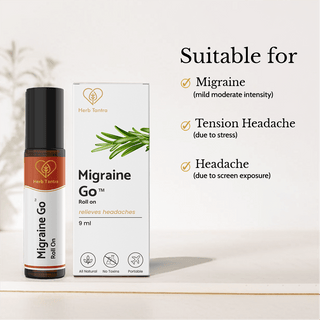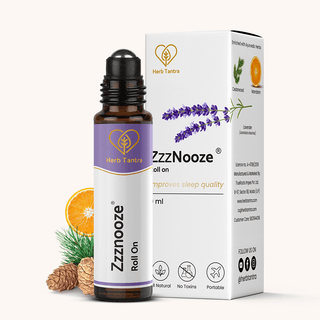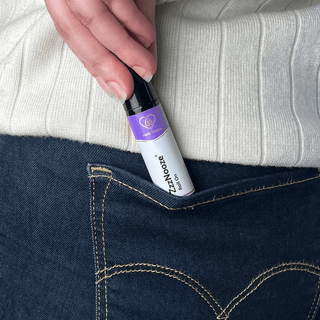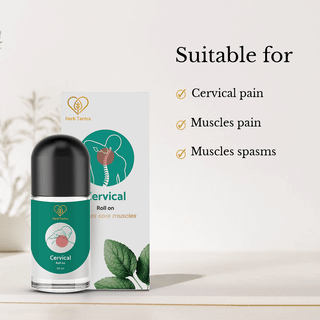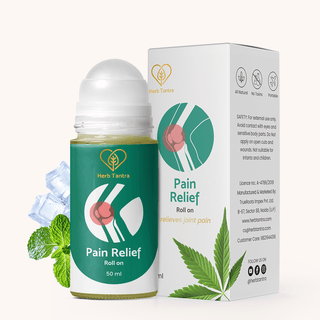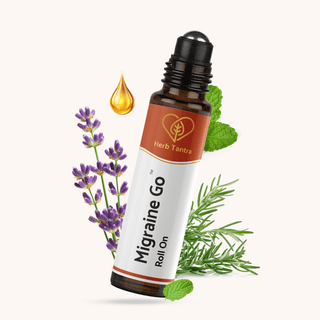Sleep is one of the most important pillars of health, yet so many of us struggle to get enough of it. Poor sleep doesn’t just leave you feeling groggy the next morning — over time, it affects your mental clarity, mood, immunity, and even your long-term physical health. If you’ve been wondering why you’re tossing and turning at night, it’s important to understand the reasons for poor sleep and what you can do to fix it.
Common Reasons for Poor Sleep
1) Stress and Anxiety
One of the leading causes of sleepless nights is an overactive mind. Stress, racing thoughts, or anxiety can keep the nervous system alert long after you’ve gone to bed. In such cases, calming rituals before bedtime help. Herbal aids like chamomile work naturally to soothe the mind. Gentle aromatherapy with roll-ons such as Sleep Buddy Roll On (Valerian Root, Bergamot, Chamomile) can also help reduce bedtime restlessness.
2) Poor Sleep Environment
Light, noise, or an uncomfortable mattress can all disrupt your sleep cycle. Even the blue light from phones and laptops interferes with melatonin production, delaying sleep. Creating a cozy sleep environment, dimming the lights, and diffusing natural calming blends like lavender and cedarwood (as in the Zznooze Roll On) can make a big difference.
3) Lifestyle Habits
Caffeine intake late in the day, irregular sleep schedules, and lack of physical activity all contribute to poor sleep. Eating heavy meals before bed also puts extra strain on digestion, leading to restlessness. Replacing evening coffee with a calming herbal tea, such as the Sleep Buddy Tea which is made with valerian root, spearmint, rose petals, and ashwagandha, can naturally prepare the body for rest.
4) Underlying Health Conditions
Hormonal changes, thyroid imbalances, or conditions like sleep apnea can also disrupt sleep. If poor sleep persists despite lifestyle changes, it’s important to consult a healthcare professional.
Signs of Poor Sleep
The signs of poor sleep often show up subtly at first but can worsen over time -
- Constant fatigue, even after 7–8 hours in bed
- Trouble concentrating or brain fog
- Irritability and mood swings
- Weakened immunity and frequent colds
- Dark circles and dull skin
If these sound familiar, your body is signaling that it isn’t getting the deep, restorative rest it needs.
Effects of Poor Sleep on Mental and Physical Health
Poor sleep and mental health are closely linked. Lack of quality rest worsens anxiety, depression, and emotional resilience. Even a few nights of insufficient sleep can make stress feel overwhelming.
On the other hand, poor sleep and physical health are equally concerning. Studies show that chronic sleep deprivation increases the risk of heart disease, obesity, diabetes, and even hormonal imbalance. Poor immunity, slower metabolism, and premature aging are all long-term consequences of neglecting sleep.
Natural Remedies to Improve Sleep Quality
If you’re wondering how to improve sleep naturally, the good news is that small changes can make a big difference -
- Set a routine - Go to bed and wake up at the same time every day.
- Digital detox - Switch off screens an hour before bed to let melatonin rise naturally.
- Aromatherapy - Natural sleep blends like Zznooze Roll On (Lavender, Cedarwood, Mandarin) or Sleep Buddy Roll On can calm the mind and signal the body to relax. Apply on wrists, behind ears, or on the soles of your feet for best results.
- Herbal teas - A cup of Sleep Buddy Herbal Tea, with valerian root, spearmint, ashwagandha, and rose petals, can become a soothing night-time ritual.
- Relaxation techniques - Yoga, meditation, or gentle breathing before bed help reduce stress hormones.
These remedies don’t just improve sleep quality but also work to restore balance in both mind and body.
Conclusion
Sleep is not a luxury; it’s a necessity for overall well-being. By identifying the reasons for poor sleep, noticing the early signs of poor sleep, and making simple natural changes, you can restore balance and rest deeply again. Herbal aids like calming roll-ons and soothing teas, combined with mindful lifestyle practices, create a holistic solution for restful nights. Remember, good sleep doesn’t just recharge your body — it transforms your health and mood from the inside out.
FAQs
1. What are the most common reasons for poor sleep?
Stress, irregular routines, excessive screen time, and an uncomfortable sleep environment are the most common causes of poor sleep.
2. How do I know if my sleep quality is poor?
Signs include fatigue, brain fog, mood swings, weakened immunity, and difficulty concentrating even after spending enough hours in bed.
3. Can poor sleep affect my physical health?
Yes, chronic poor sleep increases the risk of obesity, diabetes, weakened immunity, heart problems, and premature aging.
4. What natural remedies help improve sleep?
Herbal teas with valerian root or ashwagandha, aromatherapy roll-ons with lavender or bergamot, and bedtime relaxation techniques can all help. Herb Tantra's Sleep Better Range can help with it.
5. How can I improve my sleep naturally without medication?
Stick to a sleep routine, reduce caffeine, switch off screens early, and use natural aids like Herb Tantra's calming roll-ons or herbal teas to prepare your body for rest.





